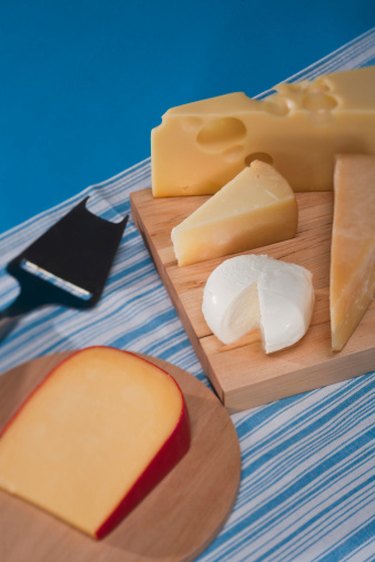
Mizithra is a Greek cheese made from sheep's milk. Some cooks who have used mizithra appreciate its taste and texture so much that they say there is simply no substitute for it. Still, others who enjoy mizithra realize that it can be difficult to find, depending on where you live, and so they suggest cheeses that can be substituted for mizithra. Since most of the substitutes are less expensive and more readily available, it may be worth trying them to see if anyone knows the difference.
Use Aged Cheeses
Video of the Day
It's important to understand that if a recipe calls for "aged" mizithra, it's asking for a hard cheese that can be grated. Mizithra without the aged specification would be the cheese in its natural state, which is a soft ball of cheese. Substitution from one to the other is not advised because their tastes and textures are so different that it would vastly alter your recipe.
Video of the Day
Ricotta Salata
Perhaps better known as Ricotta Pecorino, this is a dry, salty cheese made from ricotta, the soft cheese called for in traditional lasagna. The ricotta is pressed and aged for at least 90 days so it becomes the perfect firmness for easy grating. It is often used in pasta dishes.
Romano
Romano is a good substitute because it nearly matches mizithra in pungency and saltiness. It has a slightly, nutty flavor that mizithra typically is not recognized for, but this difference is even more pronounced when eating the cheese on its own with crackers or fruit. When mixing it into a pasta dish, the difference would likely go unnoticed. Romano's ready availability makes it a good choice for cooks that don't have access to more unusual cheeses.
Parmesan
Aged Parmesan cheese is pungent and salty, and thus a reasonable substitute for mizithra. Try using the parmigiano-reggiano version, which is preferred in Northern Italy. It is more expensive, however, so if expense is a concern, Americanized grated Parmesan works too. Be aware that the level of grating -- whether coarsely grated, finely grated or in between -- does change the taste and texture of a dish.
Cotija
Sometimes called "Mexican Parmesan," Cotija is used in Mexico sprinkled on many dishes, the way Americans use Parmesan. It's named after the Mexican town, Cotija de la Paz. Cotija is dry, with a very strong flavor, and salty, though perhaps not quite as salty as mizithra and some of the other suggested substitutes.